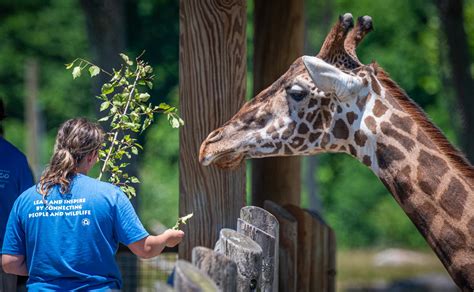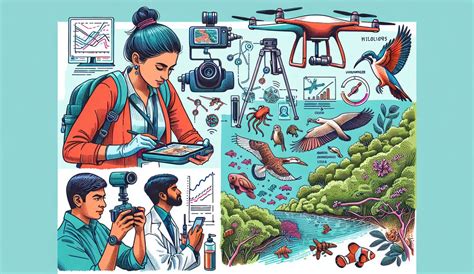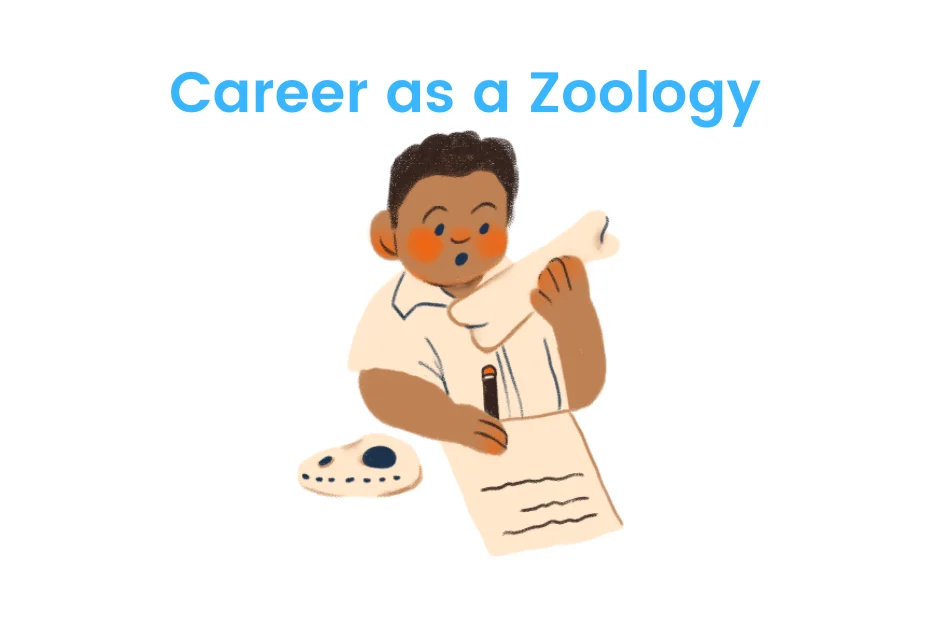Careers With Zoology

Zoology, the scientific study of animals, offers a fascinating journey into the diverse world of wildlife and their ecosystems. Pursuing a career in zoology provides an opportunity to delve into the intricate behaviors, evolutionary processes, and ecological roles of animals, from the tiniest insects to the mightiest mammals. Whether it's researching in remote natural habitats, teaching future generations about wildlife conservation, or contributing to groundbreaking discoveries, a career in zoology promises a rewarding and impactful professional path.
The World of Zoology: An Overview

Zoology, a branch of biology, focuses on the study of animals, their physiology, evolution, behavior, and interactions with their environment. It encompasses a vast array of specialties, allowing professionals to explore specific interests and contribute to the understanding of the animal kingdom.
Zoologists play a pivotal role in wildlife conservation, research, and education. They work tirelessly to protect endangered species, study animal behavior in their natural habitats, and educate the public about the importance of biodiversity. With their expertise, zoologists contribute to global efforts in maintaining ecological balance and addressing environmental challenges.
Specializations in Zoology
The field of zoology offers a myriad of specializations, each focusing on a unique aspect of animal life. Some of the key specializations include:
- Mammalogy: The study of mammals, including their physiology, behavior, and ecological roles.
- Ornithology: A specialization dedicated to birds, their migration patterns, vocalizations, and conservation.
- Herpetology: Focusing on reptiles and amphibians, their unique adaptations, and the impact of climate change on their populations.
- Entomology: The study of insects, a vast and diverse group of animals, offering insights into pest control and ecological balance.
- Marine Biology: Exploring the mysteries of the ocean, from coral reefs to deep-sea creatures, and their contribution to the planet’s biodiversity.
Each specialization provides a unique perspective and contributes to the broader understanding of the animal kingdom, making zoology an incredibly diverse and captivating field.
Educational Pathways: Unlocking the Door to Zoology Careers

Embarking on a career in zoology requires a solid educational foundation. Here’s a comprehensive guide to the academic pathways that lead to various roles in this field.
Bachelor’s Degree in Zoology or Related Fields
A bachelor’s degree is the foundational step for many zoology careers. Students pursuing a zoology major delve into courses such as animal behavior, ecology, evolution, and taxonomy. These programs often include practical components, providing hands-on experience in laboratories and field studies. Additionally, related fields like biology, environmental science, or ecology offer alternative pathways, allowing students to specialize in zoology later in their academic journey.
| Bachelor's Degree Programs | Specialization |
|---|---|
| Zoology | General Zoology, Animal Behavior |
| Biology | Ecology, Marine Biology, Conservation Biology |
| Environmental Science | Ecosystem Management, Wildlife Conservation |

Master’s and Doctoral Degrees: Unlocking Advanced Opportunities
Advanced degrees in zoology open doors to specialized research, teaching, and leadership roles. Master’s programs often focus on a specific area of interest, such as wildlife management or conservation genetics. Doctoral programs, on the other hand, are geared towards original research and often lead to academic or research leadership positions.
Here's a glimpse at some advanced degree programs and their potential career paths:
- Master's in Wildlife Biology: Focusing on the management and conservation of wildlife, graduates often pursue roles in government agencies or non-profit organizations dedicated to environmental conservation.
- Doctoral Degree in Ecology: With a focus on advanced ecological research, graduates can lead research teams, develop conservation strategies, or contribute to environmental policy-making.
- PhD in Zoology: Offering a wide range of specialization options, PhD graduates can become research professors, lead international research projects, or contribute to groundbreaking discoveries in zoology.
Continuing Education and Professional Development
The field of zoology is dynamic, with new discoveries and advancements constantly shaping the industry. Continuing education and professional development programs keep zoologists updated with the latest research, methodologies, and technologies. These programs, often offered by universities, research institutes, and professional organizations, provide opportunities for zoologists to enhance their skills, expand their knowledge, and stay at the forefront of their field.
Career Opportunities: Exploring the Pathways of a Zoologist
A career in zoology offers a diverse range of opportunities, each with its own unique challenges and rewards. From conducting research in remote wilderness areas to educating the next generation of conservationists, zoologists play a vital role in understanding and protecting the animal kingdom.
Research and Academia
Research and academia are at the heart of zoology, providing opportunities to contribute to scientific knowledge and educate future zoologists. Here are some key roles in this domain:
- Research Scientist: Conducting original research, zoologists in this role contribute to the understanding of animal behavior, evolution, and conservation. They often work in laboratories, field stations, or universities, collaborating with colleagues to advance scientific knowledge.
- University Professor: Teaching and mentoring students, university professors in zoology play a crucial role in educating the next generation of scientists. They develop curricula, deliver lectures, supervise student research, and contribute to the growth of the field through their own research endeavors.
- Research Assistant: Supporting senior researchers, research assistants play a vital role in data collection, laboratory work, and fieldwork. This role provides an excellent opportunity for hands-on experience and a deeper understanding of research methodologies.
Conservation and Wildlife Management
Zoologists play a pivotal role in conservation and wildlife management, working to protect endangered species and maintain ecological balance. Here are some key roles in this domain:
- Wildlife Biologist: Studying and managing wildlife populations, wildlife biologists assess the health and behavior of animal populations, develop conservation strategies, and monitor the impact of human activities on wildlife.
- Conservation Scientist: Focused on preserving natural resources and biodiversity, conservation scientists work to develop and implement conservation plans, collaborate with policymakers, and educate the public about the importance of conservation.
- Park Ranger: Working in national parks and protected areas, park rangers are responsible for the management and protection of wildlife and their habitats. They enforce regulations, conduct educational programs, and ensure the safety of visitors and wildlife.
Education and Outreach
Education and outreach are essential components of zoology, as they contribute to raising awareness about wildlife conservation and the importance of biodiversity. Here are some key roles in this domain:
- Zookeeper: Caring for animals in zoos and aquariums, zookeepers play a vital role in animal welfare, providing specialized care, conducting research, and educating the public about the animals in their care.
- Environmental Educator: Delivering educational programs in schools, museums, and nature centers, environmental educators inspire the next generation of conservationists by teaching about wildlife, ecosystems, and the importance of environmental stewardship.
- Writer or Journalist: Writing about wildlife and conservation issues, zoologists in these roles contribute to public awareness and understanding through articles, books, and other media, bringing attention to critical issues and inspiring action.
The Future of Zoology: Embracing New Frontiers
As the world faces increasing environmental challenges, the role of zoologists becomes ever more critical. With a focus on conservation, research, and education, zoologists are at the forefront of efforts to preserve biodiversity and ensure a sustainable future for all life on Earth.
Emerging Specializations
The field of zoology is continuously evolving, with new specializations emerging to address contemporary challenges. Here are some emerging areas of focus:
- Climate Change Ecology: Studying the impact of climate change on animal populations and ecosystems, this specialization contributes to understanding the vulnerabilities and adaptations of wildlife in a changing world.
- Urban Wildlife Management: Focusing on wildlife in urban and suburban areas, this specialization addresses the unique challenges and opportunities presented by human-wildlife interactions in urban environments.
- One Health: Recognizing the interconnectedness of human, animal, and environmental health, this emerging field emphasizes the importance of collaboration between zoologists, physicians, and environmental scientists to address global health challenges.
Technological Advancements
Technological advancements are revolutionizing the field of zoology, offering new tools and methodologies for research and conservation. Drones, for instance, are being used to monitor wildlife populations and study animal behavior in remote areas. Genetic sequencing technologies are providing unprecedented insights into the evolutionary history and conservation needs of various species. These advancements are enhancing the precision and effectiveness of zoological research and conservation efforts.
Global Collaboration and Policy Impact
Zoologists are increasingly collaborating across borders to address global conservation challenges. International initiatives, such as the IUCN Red List of Threatened Species, bring together zoologists and conservationists to assess the conservation status of species worldwide. These collaborative efforts inform policy decisions and guide conservation strategies, ensuring a coordinated global approach to wildlife conservation.
Conclusion: A Fulfilling Career Journey

A career in zoology offers a unique and rewarding journey, combining scientific inquiry, conservation advocacy, and educational impact. Whether in research, academia, conservation, or education, zoologists play a vital role in understanding and protecting the animal kingdom, contributing to a sustainable and biodiverse planet.
With a solid educational foundation, a passion for wildlife, and a commitment to conservation, a career in zoology promises a fulfilling and impactful professional life.
What are the entry-level jobs in zoology?
+Entry-level jobs in zoology often include research assistant positions, where graduates assist senior researchers in data collection and analysis. Other opportunities include roles in wildlife rehabilitation centers, zoos, or environmental consulting firms, where zoologists can gain hands-on experience and contribute to wildlife conservation efforts.
How can I specialize in a specific area of zoology?
+Specialization in zoology often occurs during graduate studies. Students can choose a specific area of interest, such as mammalogy, ornithology, or marine biology, and focus their research and coursework on that specialization. This allows for in-depth knowledge and expertise in a particular field of zoology.
What are the challenges faced by zoologists in their careers?
+Zoologists often face challenges such as funding constraints, limited access to research sites, and the ethical dilemmas associated with wildlife research and conservation. Additionally, they must stay updated with the latest scientific advancements and technologies to remain competitive in their field.
How can I contribute to wildlife conservation as a zoologist?
+Zoologists contribute to wildlife conservation through research, monitoring, and advocacy. They study animal behavior, population dynamics, and habitat requirements to develop effective conservation strategies. Additionally, zoologists play a crucial role in educating the public and policymakers about the importance of biodiversity and the need for conservation efforts.
What are the career prospects for zoologists in the coming years?
+The career prospects for zoologists are promising, especially with the increasing focus on environmental conservation and sustainability. As the world faces pressing environmental challenges, the demand for zoologists with expertise in wildlife conservation, ecological research, and education is expected to grow. Additionally, emerging specializations, such as climate change ecology and urban wildlife management, offer new avenues for career development.



